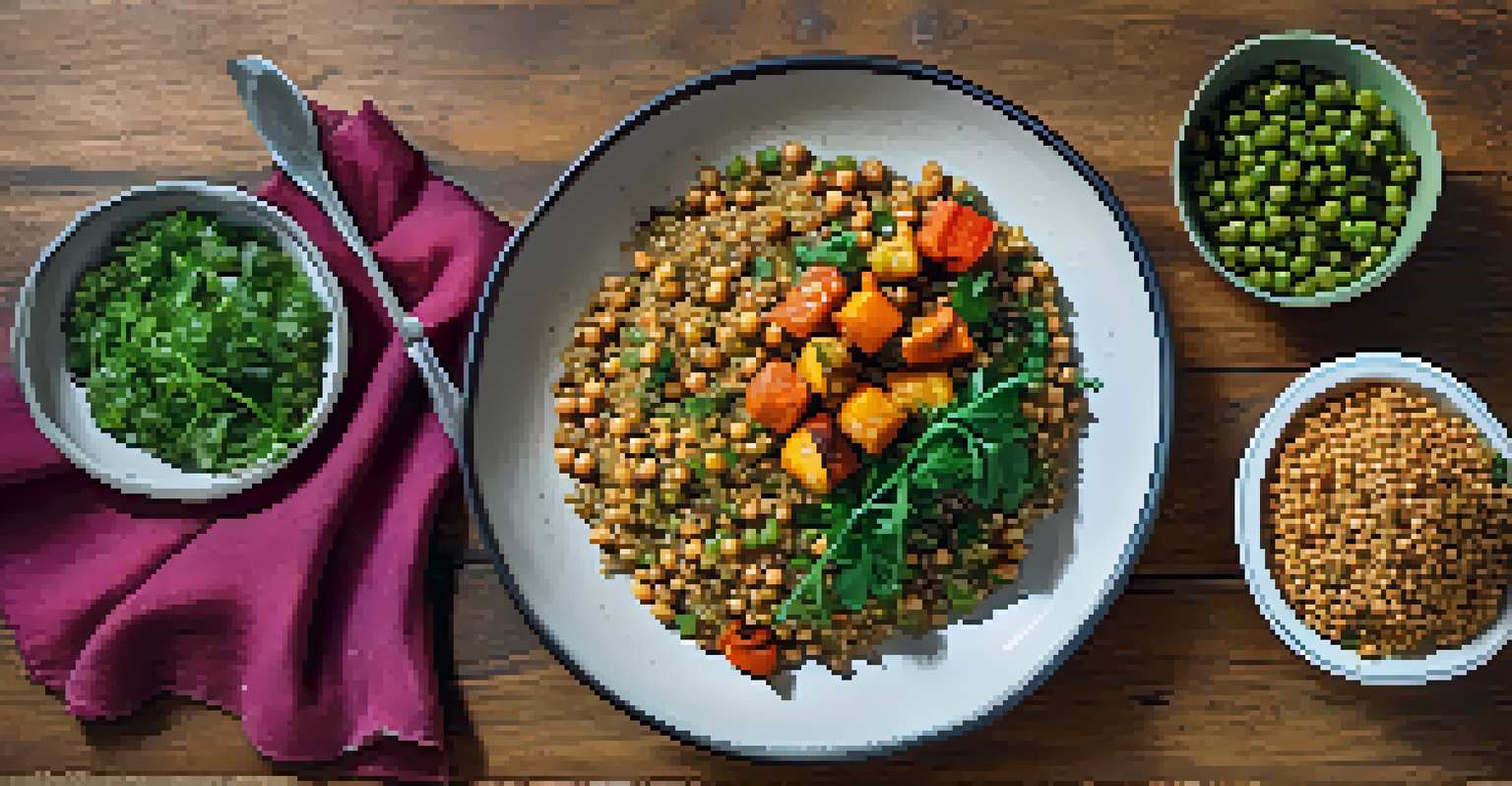Long-Term Savings: Vegetarian Diet Impact on Grocery Bills

Understanding the Basics of Vegetarian Diets
A vegetarian diet primarily consists of plant-based foods, including fruits, vegetables, grains, nuts, and legumes. Unlike meat-based diets, vegetarians do not consume meat, poultry, or fish. This shift can lead to significant changes in your grocery shopping habits and overall expenses.
The single greatest lesson the garden teaches is that our relationship to the planet can be harmonious.
By focusing on whole foods, vegetarians often purchase ingredients that are less expensive than meat. For instance, staples like beans, lentils, and rice are not only nutritious but also budget-friendly. This means that with careful planning, you can create satisfying meals without breaking the bank.
Additionally, many vegetarian recipes are simple and require fewer ingredients, which can help streamline your shopping list. This emphasis on simplicity can reduce impulse purchases, ultimately leading to lower grocery bills.
The Cost of Meat vs. Plant-Based Proteins
Meat products often take up a large portion of grocery budgets. According to various studies, the average price of meat can be significantly higher than plant-based proteins. For example, a pound of chicken or beef can cost several times more than a pound of beans or tofu.

By replacing meat with plant-based proteins, you can save a substantial amount over time. For instance, a vegetarian meal made with lentils or chickpeas can be both filling and economical. This substitution not only helps your wallet but also contributes to a more sustainable lifestyle.
Vegetarian Diets Can Save You Money
By focusing on plant-based foods, vegetarians often find that their grocery expenses decrease significantly.
Moreover, prices for meat fluctuate due to seasonal and market factors, while plant-based foods tend to remain more stable. This predictability can make budgeting much easier for those looking to control their grocery spending.
Seasonal and Local Produce: A Cost-Effective Choice
Eating a vegetarian diet often encourages the consumption of seasonal and local produce, which can be significantly cheaper. When fruits and vegetables are in season, they are not only fresher but also more affordable. Farmers' markets and local grocery stores often offer deals that can lead to substantial savings.
Eating is an agricultural act.
For example, buying tomatoes in summer when they are abundant can lead to lower per-unit costs compared to purchasing them in winter. This practice not only saves money but also supports local farmers and reduces your carbon footprint.
Additionally, incorporating a variety of seasonal produce into your meals can enhance flavor and nutritional value. The diversity in your diet can also make meal planning more exciting, helping you to stay on track with your vegetarian goals.
Meal Planning: A Key to Savings
Effective meal planning is crucial for anyone looking to save money on groceries, especially those following a vegetarian diet. By planning your meals ahead of time, you can create a focused shopping list that minimizes unnecessary purchases. This approach not only keeps your budget in check but also helps reduce food waste.
For instance, if you plan to use a bag of spinach in multiple recipes throughout the week, you can ensure that it gets used up before it spoils. This not only saves money but also leads to healthier eating habits as you’re more likely to consume the ingredients you’ve purchased.
Meal Planning Reduces Food Waste
Effective meal planning helps minimize unnecessary purchases and ensures ingredients are used before they spoil.
Moreover, batch cooking vegetarian meals and freezing leftovers can extend your savings even further. By preparing meals in advance, you can avoid expensive takeout options on busy days, ensuring that you stick to your budget.
The Role of Bulk Buying in Saving Money
Buying in bulk can be a game-changer for vegetarians looking to cut grocery costs. Staples like grains, legumes, and nuts are often available in bulk at lower prices. Purchasing larger quantities can help you save money in the long run, especially if you have the storage space to accommodate them.
For example, buying a 25-pound bag of rice or a bulk container of oats can drastically reduce the price per serving. This strategy not only lowers your grocery bill but also ensures that you have essential ingredients on hand for quick meal preparation.
However, it’s important to be mindful of perishability when buying in bulk. Focus on items with a longer shelf life, and use your meal planning skills to incorporate these ingredients into your weekly meals.
Reducing Food Waste Through a Vegetarian Diet
Food waste is a significant issue that can impact your grocery budget. A vegetarian diet can help mitigate this problem, as plant-based ingredients often have a longer shelf life than meat products. By focusing on produce, grains, and legumes, you may find that you have less spoilage and waste.
For instance, leftover vegetables can easily be incorporated into soups, stir-fries, or salads, helping you to use every bit of what you purchase. This not only stretches your grocery budget but also encourages creativity in the kitchen.
Bulk Buying Lowers Grocery Costs
Purchasing staples like grains and legumes in bulk can lead to substantial savings over time.
Additionally, being mindful of portion sizes and understanding the shelf life of various foods can further reduce waste. This commitment to minimizing waste not only benefits your wallet but also supports environmental sustainability.
Long-Term Financial Benefits of a Vegetarian Diet
While the initial transition to a vegetarian diet may require some adjustments, the long-term financial benefits can be substantial. Over time, the savings from reduced meat consumption, lower grocery bills, and decreased food waste can add up significantly. It's not just about saving a few dollars here and there; it's about fostering a sustainable lifestyle that benefits your finances.
Moreover, adopting a vegetarian diet can also lead to improved health outcomes, potentially reducing medical expenses in the long run. A diet rich in fruits, vegetables, and whole grains is known to support overall well-being, which can translate to fewer health-related costs.

Ultimately, the long-term financial advantages of a vegetarian diet can yield a healthier, more sustainable lifestyle. By making intentional choices today, you set the stage for a brighter financial future while also contributing to a healthier planet.